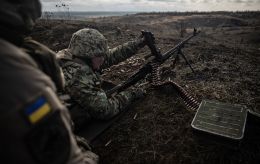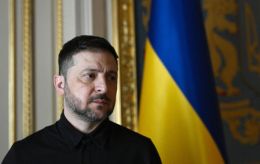Deportations and repressions: How Russia conducts ethnic cleansing of Ukrainians in occupied territories
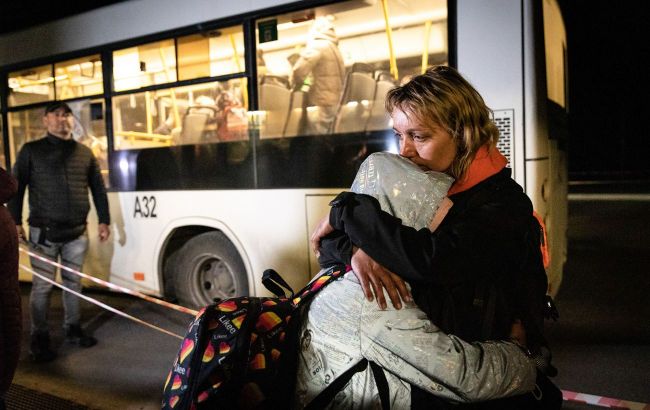 Ukrainians leave occupied Mariupol (photo: Getty Images)
Ukrainians leave occupied Mariupol (photo: Getty Images)
Having occupied part of Ukraine's territories, Russia is seeking to subjugate or destroy Ukrainians on their land. RBC-Ukraine's article explains how the invaders conduct ethnic cleansing, where Ukrainians are deported, and why Russians are buying apartments in Mariupol.
Over the past two years of the war in Ukraine, Russia has been actively using the narrative that Ukrainians are a non-existent nation. Publicly, Kremlin propaganda says that Ukraine was created by Vladimir Lenin, that Kyiv is a Russian city, and that all of Ukraine's cultural heritage is either fiction or something that belongs to Russia.
At the same time, Russia is seeking to either neutralize or destroy the Ukrainian ethnic group. In the occupied territories, it burns historical textbooks, loots museums, and conducts outreach to the population. In addition to propaganda, repression, and inducement to collaborate, the Russian occupation army, together with the special services, conducts ethnic cleansing.
Ukrainians are being squeezed out of their cities, forced to move to Russia, or deported. Russian citizens are being "embedded" in their apartments, workplaces, and everyday life. Thus, the Kremlin, planning to play the long game, wants the captured Ukrainian city to be filled with Russians loyal to it.
The scheme used by the Russian Federation has been used for a long time. At one time, forced expulsions affected Chechens, Crimean Tatars, Kalmyks, residents of the Baltic States, Ingush, and Bulgarians. Joseph Stalin was the most active in this field, and his actions would later be called the era of Stalinist repression. Ethnic cleansing is one of the key tools of Russia's colonial policy and has all the hallmarks of genocide.
They have tried to destroy Ukrainians as a nation before, but today - during the years of Ukraine's great war with Russia - the Kremlin has every opportunity to make this process as large-scale as possible.
So-called protection of people of Donbas
In 2022, Russia attacked openly, announcing the launch of a so-called special military operation. In 2014, Russian soldiers entered the territory of Donbas and Crimea without insignia, and the Kremlin denied any involvement in the military conflict on the Ukrainian borderlands.
At the same time, the Kremlin actively broadcast statements that the people of Donbas were being repressed by Ukrainians and needed to be protected. It was with this motivation in mind that Putin announced the launch of the special military operation on February 24. However, the Russian occupation authorities, taking advantage of their long stay in parts of Donetsk and Luhansk regions, launched a large-scale mobilization of the entire male population, says Denys Kazanskyi, a journalist born in Donetsk and former representative of Ukraine in the Trilateral Contact Group.
"They were catching them on the street like animals. Again, mobilization involves some procedures, when a person undergoes a medical examination, various restrictions are revealed. And for them, it happened like this: they caught them on the street, took them to the military enlistment office, gave them some old jackets from the warehouse, mosquito nets, and just threw them to the front without any training," Kazanskyi tells RBC-Ukraine.
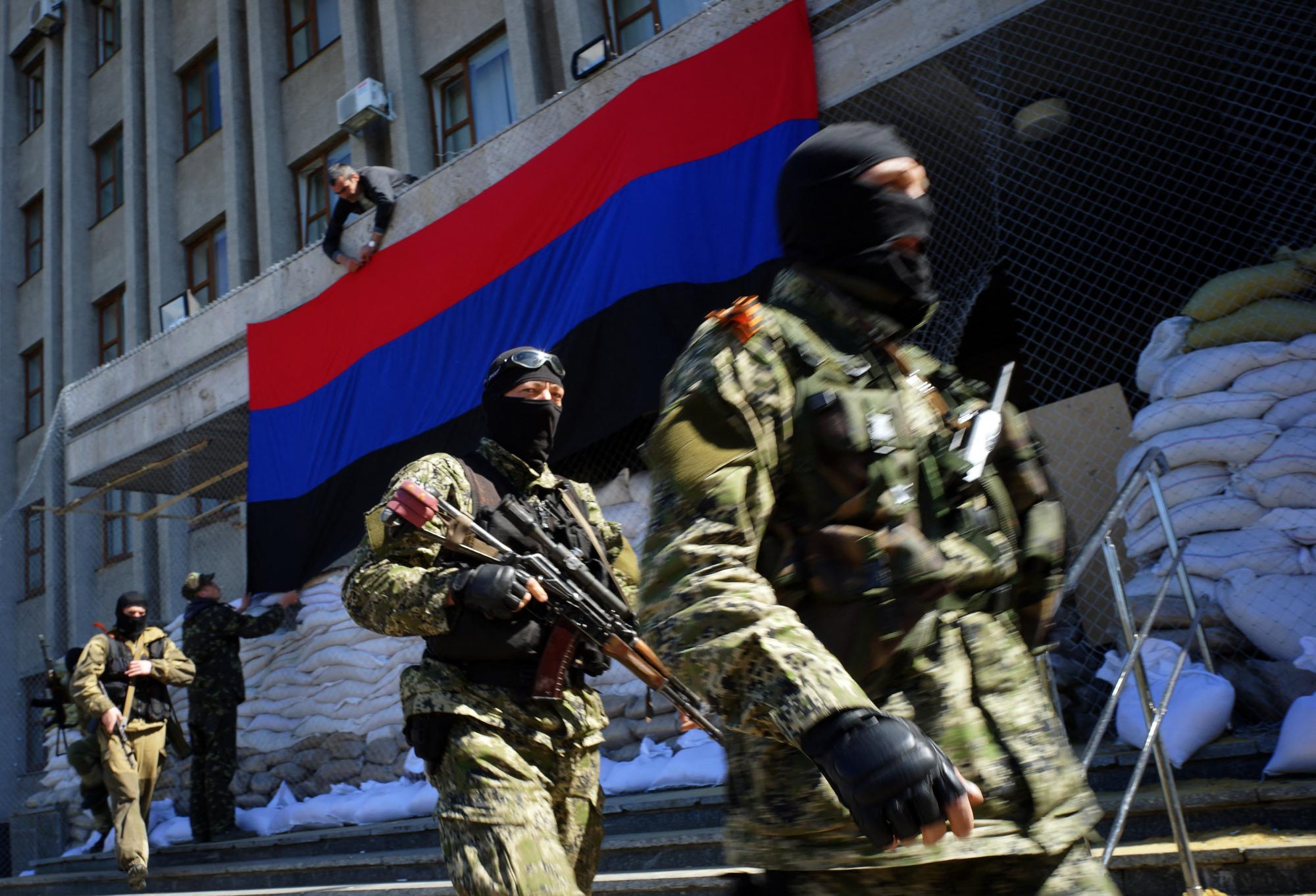 April 2014, pro-Russian activists plant the flag of the so-called Donetsk People's Republic in Sloviansk (Photo: Getty Images)
April 2014, pro-Russian activists plant the flag of the so-called Donetsk People's Republic in Sloviansk (Photo: Getty Images)
Initially, they tried to recruit Donbas residents into the ranks of the so-called Donetsk People's Republic and Luhansk People's Republic armies voluntarily, and a small number of them volunteered. But the overwhelming majority of men of almost any age were taken by force to fight in the war with Ukraine.
"A lot of people died then. They were mostly driving these mobilized in the front lines. Now there are not so many of them left, they have raked all the men out of there. That's why they're already mobilizing Russians because a lot of people died in the first wave. No one counted them, the Russian army did not even include them in its losses, because they are allegedly the losses of the so-called Donetsk People's Republic and Luhansk People's Republic armies, Kazanskyi adds.
For eight years, the Kremlin has been actively Russifying parts of Donetsk and Luhansk regions, broadcasting propaganda and narratives that Donbas is Russia. As a result, during the first months of the full-scale Russian invasion of Ukraine, the Russian occupiers killed thousands of Ukrainians, forcing them to commit war crimes and take up arms against their people.
This method is not new. For example, the Kadyrovites who are fighting in the Russian army today are descendants of Chechens who were killed by the same Russian army in the late 1990s and early 2000s. Conquering, bending to one's will, and forcing new territories to be seized are the basis of the colonial policy of any empire. But while the residents of Donbas were mobilized after eight years of active propaganda, the situation with the newly occupied territories turned out to be much more complicated: the population of Zaporizhzhia or Kherson regions still has the strength to resist. Therefore, the process of ethnic cleansing there is somewhat more subtle.
"Go to Voronezh"
A few months after Russia's invasion of Ukraine began, a public called "Real Estate of Mariupol and Pryazovia" appeared on the Russian social network Vkontakte. In it, Russians posted ads: "I'll buy a house. Inexpensive, partial destruction is acceptable", "I will buy a house by the sea, any condition", "I will exchange a house in Volgograd for a private house in Mariupol".
There are hundreds of such ads on the Russian segment of the Internet. Russians are looking for a place to live at a low price and preferably near the sea. Potential buyers are not concerned about the status of Mariupol and nearby cities, the condition of the apartment, or even the moral and ethical side of the issue. In their comments to Russian media, when asked if they are afraid that Mariupol will be de-occupied, Russians who want to buy an apartment there, as if following the copy of state propaganda, assure journalists that Russia will not give up the city.
.jpg) Occupied Mariupol (Photo: Getty Images)
Occupied Mariupol (Photo: Getty Images)
The very existence of such announcements is one of the intermediate results of the process that the Kremlin has launched in some of the occupied territories. Ethnic cleansing is the deportation or destruction of the local population. One of the ways to get rid of residents of occupied cities is to do everything possible to make them leave and never return. On the territory near the Sea of Azov, in Mariupol, the Russian occupying authorities are particularly concerned about the housing issue.
Svitlana (name changed at the request of the woman for anonymity - ed.) has lived in Mariupol since 2014, having moved there from Donetsk. On February 24, when the Russians shelled the city, she packed up her son and left, while her husband, a soldier, stayed in the city. The woman had been renting the apartment for many years and had managed to accumulate a large number of her belongings there. On February 28, she received a call from the landlady.
"She said, let's take the meter readings. I told her that I had left the city and offered to take or distribute the food to the neighbors, we had a lot of food in the fridge and on the balcony. I asked her very kindly not to throw things away and promised to continue paying the rent. I bagged her to keep my things," Svitlana tells RBC-Ukraine.
After the active phase of hostilities in Mariupol ended and the city was occupied, a woman she knew agreed to come to her house and find out what was happening to her apartment. "I didn't need fur coats or appliances, there were memorabilia there. The same bathtub in which we baptized our child, albums, the first photos of my son. I remember it all very well."
The woman could not get into the apartment and talked to the neighbor on the floor. She told her that a Russian family had been living in the apartment for a long time. "My friend asked her what happened to my things, and the neighbor was so theatrically surprised, she said, "What things? They threw everything away. The belongings of such people (referring to the military - ed.) cannot be kept," Svitlana adds.
A similar situation occurred with a resident of Mariupol, Serhii (name changed for anonymity - ed.), whose story was told by his relative. Until 2022, he owned three apartments in the city. After the Russian invasion, the house where he lived was hit by a rocket and since then Serhii has been missing. His other apartment remained relatively intact and it is no longer empty.
"Even from the street, you can see the freshly renovated apartment. When we tried to find out who lived there, no one opened the door. We found the contact of the so-called head of the condominium, who said that people of Caucasian appearance had recently moved in, but there was no contact with them and they did not want to touch them. Everyone understands everything," says Serhii's relative.
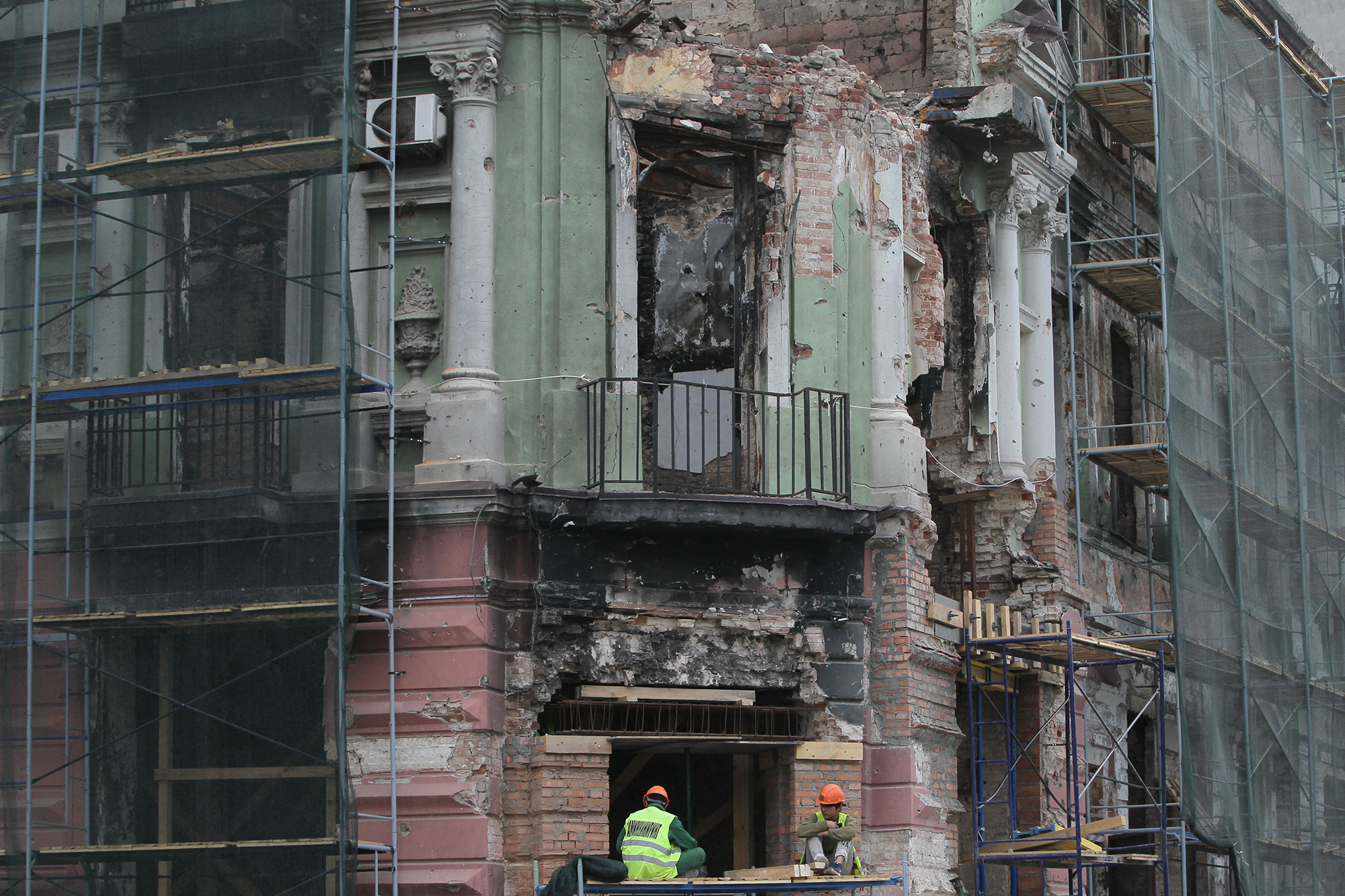 Russian construction workers sit on scaffolding near a destroyed house in Mariupol (Photo: Getty Images)
Russian construction workers sit on scaffolding near a destroyed house in Mariupol (Photo: Getty Images)
Mariupol municipalities, where collaborators work, carefully collect information about the housing stock. Empty apartments are given away or sold. This, of course, is not without nepotism - under the illegitimate government, it is not a problem to make a deal to transfer someone else's property to yourself or relatives.
Part of the housing stock is dilapidated or destroyed, and the owners of such apartments still live in Mariupol. The occupation authorities promise residents so-called compensation apartments, but as a result, Mariupol residents are left with nothing, says Petro Andriushchenko, an advisor to the mayor of Mariupol.
"What is going on? People are being evicted under the pretext of reconstruction or repair. They say you have to leave the premises. In return, they give nothing, nothing at all - no dormitories, no maneuverable housing. There is no new housing and they cannot claim it. That is, people cannot claim the promised compensatory housing because their housing seems to have survived. Similarly, they cannot receive monetary compensation for new housing, because they seem to have survived," Andriushchenko tells RBC-Ukraine.
Meanwhile, Russian contractors are selling the apartments after making simple repairs, installing windows, and renovating the facades. Mariupol residents, unable to buy back their own homes, are forced to leave. And that's when the offers come in.
"Suddenly, the same contractors come to these people who are left without housing and say, "Go to Voronezh, there is a program there, you will be given housing, and so on. No one talks about this loudly," Andriushchenko adds.
A similar story is happening with job search. The Russian occupying authorities are opening new jobs with legal wages, but they are not hiring locals - they are waiting for Russians. Mariupol residents are left to look for part-time work, where there is a high risk that they will not be paid at all, and there is no point in complaining to local law enforcement. It all comes down to the fact that the local population is simply being squeezed out of the city.
"Completely different people are moving in their place. There is Chelyabinsk and central Russia. Most of them come from places where there is no sea. Oddly enough, the Leningrad region, Lipetsk, and Kursk are leaving for Mariupol. Why do they leave - the climate is normal, and the sea is nearby. The conversations between them are the same: they come back from work and tell their families that everything is fine there, the city is being rebuilt, and they should go there for permanent residence. And then they go with their families, settle down, and live there," adds the advisor to the mayor of Mariupol.
In addition to the obvious goal of ethnic cleansing, this whole process has another, perhaps the most important factor: the Russians see Mariupol as a major logistics hub. The Kremlin needs to invest in the city by the sea to have another option for controlled communication between Russia and Ukraine. To do this, Mariupol must become as loyal to the Russian occupation authorities as possible.
However, we cannot say that Russia is turning Mariupol into a highly developed city. On the way from the Russian treasury to the pockets of local contractors and contractors, budgets are noticeably reduced. Therefore, both the housing stock and the city's urbanism look rather poor. But the Kremlin propaganda, attracting Russians to move to the city by sea, does not show pre-war Mariupol; it compares the city today to the one destroyed by the Russian army two years ago. In this context, the so-called restoration is much more visible.
 Evacuation from Mariupol (Photo: Getty Images)
Evacuation from Mariupol (Photo: Getty Images)
A similar situation exists in all the occupied territories to varying degrees. In the part of the Kherson region occupied by the invaders, Russians who came there are registering housing near the sea, says Oleksandr Tolokonnikov, a spokesperson for the Kherson Regional Military Administration.
"There are a lot of seized houses in the coastal area by the sea. Hotels and guest houses have been seized, where they either live or settle. If the owners have left, these houses are re-registered under the law through the courts, again, Russian courts," Tolokonnikov says.
Other occupied territories are not being rebuilt by the Russians - some cities like Melitopol or Berdiansk were taken by the Russian army almost without a fight. Part of the Kherson region is actually in the war zone. But even there, the Kremlin continues to pursue its colonial policy, actively evicting Ukrainians from there.
Disloyal
"We evicted a large number of families. It was very difficult to do. But we did. Those who in one way or another did not support the special military operation. Those who insulted the flag and anthem of Russia, the president of the Russian Federation."
These are the words of Yevhen Balytskyi, a gauleiter from the Zaporizhzhia region, who fled to Russia a few months after the invasion began. He openly says that the Russian invaders are evicting the local population from the occupied territories of the Zaporizhzhia region.
Russian officials, of course, cannot make the same bold statement about evictions, so they veil this process under the phrase "evacuation without Ukraine's participation." According to them, over the past two years, about two million Ukrainians have been "evacuated" to Russia, 300,000 of whom are children.
In the occupation, residents are first forced to undergo so-called filtration, during which they check their family ties and civic position. After that, Ukrainians are sent first to the border areas and then "distributed" to different Russian regions, mostly depressed ones, as reported by the Main Intelligence Directorate of the Ministry of Defense of Ukraine in March 2022.
 Deportation of Ukrainians to Russia (Photo: Russian media)
Deportation of Ukrainians to Russia (Photo: Russian media)
Ukrainians are being resettled as far as possible, for example, to Siberia, the Arctic Circle, or the Far East, as the UK newspaper The Independent reported, citing Kremlin directives. There, the migrants are forced to take a Russian passport and are issued documents that oblige them to stay in Russia for two years. People are settled in special camps and immediately assigned to employment services, which soon find them jobs.
According to Russia's plan, a Ukrainian who finds himself far from home, without money and contact with his family, is forced to live according to the imposed scheme. In a few years, he will become a representative of one of the many national minorities whose membership is not taken seriously and is suppressed in every possible way. This scheme, developed in the years of the Soviet Union, is quite banal, but very effective. Using this scheme, the USSR, and later in modern Russia, committed more than one genocide against one or another ethnic group.
While Ukrainian troops are trying to drive the Russian army out of Ukraine, the Russian occupation continues. The Kremlin is spending large sums of money to Russify Ukrainian regions and cleanse them of their local population. In Russia's ideal picture, the Ukrainian lands it has seized should soon have no trace of the local ethnic population.
The Russians methodically populated the adjacent lands that had nothing to do with them, assimilated there, and later claimed that this was their historical territory. Some countries that once suffered from Russian occupation have found a way to deal with it. For example, after the collapse of the USSR, the Baltic states claimed that they had been occupied by Soviet troops and passed a law on the restitution of property nationalized in the 1940s. According to this law, the former owners had the right to claim the real estate that had been seized by the Soviets in those years. An incredible amount of work was done, and many Baltic residents were able to receive their inheritance. The Russians had to leave.
In this context, it is very important for Ukraine not only to liberate the occupied cities and villages but also to register every Russian who today buys an apartment in Mariupol and registers a house in the Zaliznyi Port. Otherwise, even after the liberation, Ukraine risks having another so-called Russian diaspora on its territory, which will sooner or later ask to be "protected" again.
